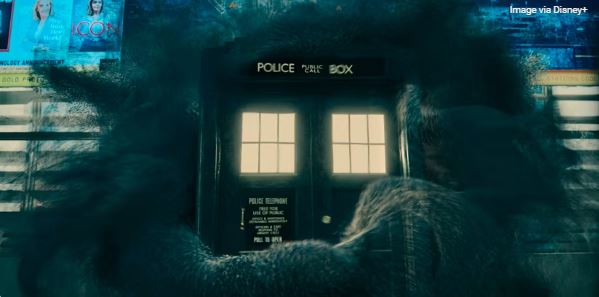Sutekh’s Doctor Who return after such a lengthy period raises the question of why he was so impossibly patient ahead of his comeback, but there’s a theory that can explain it. After first appearing in Doctor Who’s classic era, Sutekh came back to the show in Doctor Who season 14’s penultimate episode, “The Legend of Ruby Sunday.” The two-part finale of Ncuti Gatwa’s inaugural run as the Fifteenth Doctor is only Sutekh’s second live-action appearance. While a substantial period of almost 50 years had passed between Sutekh stories, it was far, far longer within the world of Doctor Who.
Sutekh’s 1975 debut in “Pyramids of Mars” had him facing off against Tom Baker’s Fourth Doctor. Four’s victory was only slight, but returning showrunner Russell T Davies has retconned the story’s ending by having the Doctor only believe Sutekh to be vanquished, with the God of Death clinging to the TARDIS ever since. It’s a huge change to Doctor Who canon that means the villain has secretly been present in every adventure between “Pyramids of Mars” and his return in Doctor Who’s Disney era. In other words, almost every actor to play the Doctor has never been far from Sutekh.
Theory: Sutekh Couldn’t Return While Doctor Who’s Time Lords Still Existed

The One Who Waits was wise to be so patient
Sutekh was initially thwarted by the Fourth Doctor, a lone Time Lord against an incredibly powerful being who could kill with just a single touch. As a result, Doctor Who’s The One Who Waits had a healthy respect for the Doctor’s society, and was smart not to reveal himself while there were so many other Time Lords throughout time and space. The Doctor’s “Last of the Time Lords” story was never in effect during the classic era, with the show’s main character just being a breakaway from Gallifrey. So, it makes sense that Sutekh would choose to remain hidden.
Gallifrey has dipped in and out of existence a number of times since the 2005 Doctor Who revival, but the planet and its people weren’t truly wiped from existence until Sacha Dhawan’s Master committed a Time Lord genocide throughout time and space during Jodie Whittaker’s run as the Thirteenth Doctor. Interestingly, Sutekh first started to stir in “Wild Blue Yonder,” which wasn’t too long after the Master’s hideous actions. So, with the most powerful being in Doctor Who’s Pantheon of Gods confident that the Time Lords wouldn’t descend upon him, he began to plan his big reveal.
Why The Time Lords Likely Would Have Fought Against Sutekh

The Doctor’s people have been known to intervene in certain matters
Time Lords as a society generally don’t intervene in any matter through time and space, as most see themselves as observers more than anything else. However, this philosophy has been inconsistent through the millennia. Not only do individuals like the Doctor and the Master often step out into the universe to interact with various races and civilizations, but the Time Lords themselves have also chosen to step in given the right circumstances. The biggest factor in whether they tend to intervene is whether they are at least part of the cause for whatever’s gone wrong.
If Sutekh emerged, and it was revealed he’d commandered a TARDIS, the Time Lords wouldn’t stand idly by.
For example, the final Second Doctor story, “The War Games,” featured a renegade Time Lord called the War Chief, who had aligned himself with a nefarious alien species and tried to help them build an army. Patrick Troughton’s Doctor asked the Time Lords for help, and they assisted in the adventure’s aftermath. There’s also the matter of the Time Lords going to war with the Daleks, so there are instances where the society doesn’t align with the description of mere observers. So, if Sutekh emerged, and it was revealed he’d commandered a TARDIS, the Time Lords wouldn’t stand idly by.
Sutekh Was Much Weaker During Doctor Who’s Classic Era

The God of Death needed time to reach “Godhood”
There is no denying that Sutekh was a formidable foe the first time around. Even from his prison on Mars, he was able to take control of Earthbound avatars and use them to deliver his “Gift of Death.” However, in the centuries since his last direct encounter with the Doctor, he’s been exposed to the Time Vortex and been familiarizing himself with how the TARDIS works. The God of Death openly explains in “Empire of Death” that he has been growing steadily more powerful since he latched onto the blue box in “Pyramids of Mars.”
“I clung to your infernal machine, and for so many years I hid. I have traveled with you for all this time, riding the spine of your ship, staring into eternity and evolving into my true godhood. Now I know every beat of the heart of your time machine, and I can bend it to my will. It will stand as my altar, the temple of my Empire of Death.”
So, Sutekh apparently felt he needed all this time to become as powerful as he aimed to be. Paired with the ongoing presence of the Time Lords until the Master killed them, the timing of Sutekh’s resurgence in “The Legend of Ruby Sunday” makes much more sense than it just being some kind of random decision. If he’d chosen to reveal himself any sooner, it’s highly likely the Doctor would have been able to defeat him again almost immediately. Even if he couldn’t, then the Time Lords may have arrived to remove the TARDIS from the villain’s grasp.
Interestingly, the entirety of Doctor Who season 14 is a stealth sequel to Tom Baker’s “Pyramids of Mars” story from 1975. Not only is this acknowledged by clips from the original story appearing on the Time Window screen in “Empire of Death,” but also by a clever casting decision. Gabriel Woolf returns in the season 14 finale to voice Sutekh after playing the part in Doctor Who’s classic era. Woolf also voiced the Beast in Doctor Who season 2, episodes 8 and 9, “The Impossible Planet,” and, “The Satan Pit.” This suggests a link between the two characters.
Sutekh Would Have Known The Time Lords Survived The Time War

The Doctor Who villain had the advantage of access to the TARDIS
If Sutekh was indeed waiting for the fall of the Time Lords before he revealed himself, there’s an argument to say that he could have done so after they were all seemingly killed after the Time War. However, with the God of Death having such unfettered access to the TARDIS, a machine that can go, has been, or will go to any corner of time and space, Sutekh may have been fully aware that the Time Lords secretly survived the Time War rather than perishing as the Doctor thought.
So, while it may have been tempting for Sutekh to come back after the Time War, he ultimately made the wise decision of staying concealed. It was only after the Master’s genocide that Sutekh knew for sure that he wouldn’t be opposed by any Time Lords other than the Doctor. Given the advantage over Gatwa’s Fifteenth Doctor, which he’d gained by maintaining the element of surprise, The One Who Waits gave himself the best chance of maintaining a permanent Empire of Death. Unfortunately for him, Doctor Who’s main character also played the long game and beat Sutekh again anyway.
